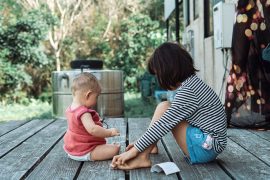4. Model Balanced Self-Care
A parent who never rests silently teaches that burnout is acceptable. Schedule small, low-cost restorative acts – gardening, reading at bedtime or guided meditation – and tell your child what you are doing and why. They learn that well-being is worth protecting, and money worries do not eclipse personal growth. Over time, this perspective breeds the confidence children need to face their future challenges and makes them better equipped to handle whatever comes their way.
5. Build and Explain Safety Nets
Cushioning shocks reduce the emotional jolt for everyone. Set up a small emergency fund – however modest – and tell children why it exists. Review insurance coverage, too. Many households overlook additional living expenses insurance, which reimburses food, hotels and travel expenses if you must live elsewhere after a covered incident. Knowing that a roof and routine can be maintained – even in a crisis – makes children feel secure and teaches practical preparation.
6. Strengthen Community Connections
Isolation magnifies stress. Reach out to extended family, school pastoral staff, local parent groups or community centres. Shared child care, communal meals and clothes swaps stretch budgets while giving children a network of trusted adults. Such connections act as emotional shock absorbers and give them – and you – a sense of belonging. They will see helping and receiving help as ordinary parts of life – not evidence of failure. Research links supportive relationships with better mental health outcomes, regardless of income level.
7. Encourage Everyday Acts of Generosity
Children can learn that kindness is never in short supply, even with a pinched family purse. Invite them to sort through clothes or books they have outgrown for donation or join you in preparing a simple meal for a friend who is ill. Explain that these gestures do not weaken a budget – they strengthen the social web that carries everyone through lean spells. When children find that they can give, they feel capable rather than constrained. This is an outlook that cushions self-worth against future financial strains.
Planting Seeds of Lifelong Stability
Shielding a child from financial stress is less about erecting walls and more about planting strong roots – honest conversation, thoughtful planning, visible self-care and reliable routines. Each seed takes time to sprout, yet together, they grow a household culture where difficulties are faced, feelings are owned, and solutions are sought. Emotional resilience flourishes – whatever the economy brings next.
Jane Marsh is the founder and editor-in-chief of Environment.co where she shares practical tips on how to live a greener life.










